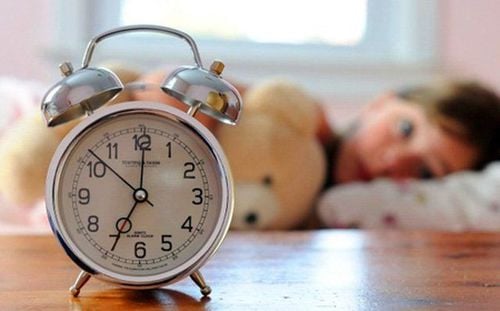This is an automatically translated article.
Have you ever had trouble waking up? Or wondering how to wake up early? If you're having trouble waking up, you may need help understanding what's causing you not to wake up in the morning and what to do about them. Let's read the article below to get a better answer.
1. Why do I feel like I can't get out of bed every morning?
If you have trouble waking up every morning, you are not alone. Whether it's setting the alarm multiple times or stumbling out of bed and wondering why it's so hard to wake up, when all you want to do is sleep?
It could be more than just a matter of laziness, but it could be a sign that your biological clock is in trouble. Here are 8 reasons why it's hard for you to wake up in the morning:
Poor sleep quality. Snoring, uncomfortable temperatures, or frequent trips to the bathroom at night can cause you to have poor sleep quality, and make it harder for you to feel refreshed and alert in the morning. Mental health status. Anxiety, stress, and depression can cause lethargy and sleepiness, which can also contribute to excessive morning sleep. Go to bed late. If you're going to bed late, it's not uncommon for your body to ask you to stay in bed a little longer. Drink caffeine. Drinking caffeine too late in the day or evening can disrupt the quality of your sleep. Even if you've slept through the night, your sleep cycle isn't as active as it is when you have caffeine in your body, as it makes your brain more active. Late exercise. When you exercise too close to bedtime, it can cause your heart rate and metabolism to increase and you may be too tired to get quality sleep. Use drugs. Anti-allergy medications such as antihistamines and leukotriene inhibitors can cause drowsiness and make it difficult to wake up in the morning. Age. Sleep patterns tend to change as you age. Many people find that as they age, they have trouble falling asleep and staying asleep. This can lead to poor sleep quality and excessive morning fatigue. Sleep disorders . In addition to lifestyle factors, you may be experiencing insomnia, sleep apnea, narcolepsy, restless legs syndrome, or another sleep disorder.

Tình trạng ngủ khó dậy do nhiều nguyên nhân khác nhau gây ra
2. Tricks to wake up earlier in the morning
How to get up early? Surely many people set their alarms with the best of intentions, knowing that's when they need to wake up to meet the needs of the day. However, even if the clock goes off again and again, you still wake up late. The key is inside your body. Sleep researcher Leon C. Lack, PhD, professor emeritus at the school of psychology at Flinders University in Adelaide, Australia, says: "It's important to be able to wake up easily at times. Morning wishes are the time of circadian rhythms, or 'body clocks'. Much of what you need to do to wake up on time starts with planning your sleep schedule the day before.”
How do our biological clocks work and to what extent can we control them? According to the National Institutes of General Health Sciences (NIGMS), the body's master clock, located in the brain, produces and regulates our circadian rhythms, which help determine sleep patterns over a 24-hour period. Environmental cues, such as daylight and darkness, also affect circadian rhythms. When incident light hits the optic nerve, information is transmitted from the eye to the brain. When there is little or no light at night - your clock tells the brain to make more melatonin, a hormone that makes you sleepy.
According to the National Institute of Neurological Disorders and Stroke, our sleep-wake cycles, hormone levels, metabolism and body temperature are all influenced by our circadian rhythms. NIGMS notes that irregular rhythms are associated with chronic health conditions, such as obesity, diabetes, depression, bipolar disorder, and seasonal affective disorder.
But there are ways to recalibrate your system to get the sleep you need and wake up feeling refreshed and ready for the day. Physiological and psychological factors come into play, and it's not always easy to get a good night's sleep or stick to a schedule so that you always go to bed and wake up at the same time each day. Here are 11 tricks to wake up earlier in the morning:
Know why you want to improve your waking process What is your motivation? Do you want to wake up on time to have breakfast with the family, exercise or just have a few minutes of reflection to better prepare for the day? Once you've figured out your reason, take the second step and tell your family or roommates about the change you want to make. Accountability helps as much as an alarm clock.
Specific activity times for your morning Now that you know what you want to do when you wake up and sleep more than you need to do, consider cutting back on your morning activities. This may allow you to set the alarm for a few minutes (or more) later. If you've decided you want to have breakfast time with the family, save time the night before by organizing your clothes, shoes, and bags. Are you spending 15 minutes in line at the coffee shop for coffee? That's a quarter of an hour you can sleep by buying a coffee maker with a timer.

Hãy cân nhắc các hoạt động buổi sáng khi không ra khỏi giường được
Get a closer look at your body's internal clock One way to figure out what might work best for you is to set a consistent bedtime that begins about eight hours before the alarm goes off. Stick with it for a few weeks (including weekends) to see how your body responds. Note that some people are often active at night and it will be difficult for them to go to bed early (at least early for them), even if they have to wake up early too.
Try a melatonin supplement Your body naturally produces melatonin to stimulate your sleep, but you can also take a melatonin supplement to help reorient your body clock. Try the lowest dose possible so starting with 0.5 to 5 milligrams is common - five to six hours before bedtime for a few days.
Melatonin does not work effectively for sleep disorders and can even lead to next day sleepiness for some people. You should talk to your doctor before taking supplements because of the potential for side effects and interactions with other medications you're taking. People with autoimmune disorders or diabetes, and who are taking oral contraceptives, blood thinners, tranquilizers, or certain blood pressure medications, should not take melatonin without first discussing it with their doctor.
Power off your devices and turn off the TV before bed Part of waking up on time is getting enough sleep the night before. And getting ready for bed is a relaxing process. Segar warns that spending time in front of a screen — whether it's the TV, laptop or phone — until bedtime won't lead to a good night's sleep.
Get sunlight first thing in the morning Sitting in front of the bright lights of a flat screen TV before going to bed can make it difficult to fall asleep, but bright light for an hour or two after waking can helps set your body clock to accept your wake up time. If your schedule allows, a walk in the morning sunshine or a leisurely breakfast on the patio will both be good for your mood and help you get a better night's sleep.
Rearrange your evening schedule To find out what is affecting your sleep and your waking hours, look at your daily activity and how you spend your evenings. You may have to reorganize some of your activities. For example, even if the only time you can go to the gym is after dinner, this time period can cause you to not get a good night's sleep. You should find another time to exercise earlier in the day.
According to a survey by the National Sleep Foundation, about 12% of adults believe their work schedules keep them from getting enough sleep. If you are overloaded with work and constantly work late at night, try to find a solution.

Lịch trình làm việc hợp lý sẽ giải quyết tình trạng ngủ khó dậy của bạn
Self-assess to see what is affecting your sleep Sleep disturbances, such as obstructive sleep apnea, or health problems, such as allergies or depression, can cause you to have poor quality sleep. No matter how hard you try to go to bed on time and wake up on time, you will still feel tired in the morning and sleepy during the day.
Make waking up more challenging Now that you've identified the obstacles to going to bed on time, it's time to create some obstacles to going to bed. If your alarm is right next to your bed and you can easily tap the big "snooze" button without lifting your head off the pillow, you'll probably try to get some extra sleep. Put an alarm clock at the other end of the bedroom so you have to get up to turn it off.
Also consider setting a second alarm - far away - if you have a lot of trouble waking up. When you're trying to reset your sleep and wake times, you can also ask family members or roommates to help you wake up until syncing.
Keep a sleep diary and evaluate it weekly Track all your efforts to sleep better and write down how you feel. Do you have more energy? A happier mood? Are you more patient with your family? Are you still sleepy or hit the snooze button of your alarm clock?
After you've tried a new strategy or two for a week, look at your diary. If the steps you're taking are working, keep taking them. If not, look back at the obstacles and consider other strategies you can try. Segar recommends doing this weekly cycle of testing and evaluation for 6 to 12 weeks.
Vinmec International General Hospital is one of the hospitals that not only ensures professional quality with a team of leading medical doctors, modern equipment and technology, but also stands out for its examination and consultation services. comprehensive and professional medical consultation and treatment; civilized, polite, safe and sterile medical examination and treatment space.
Please dial HOTLINE for more information or register for an appointment HERE. Download MyVinmec app to make appointments faster and to manage your bookings easily.
Reference source: webmd.com












